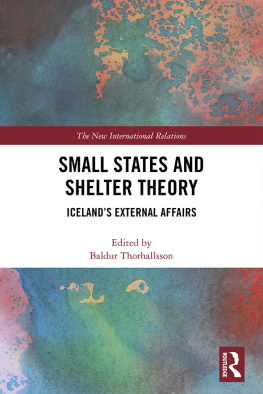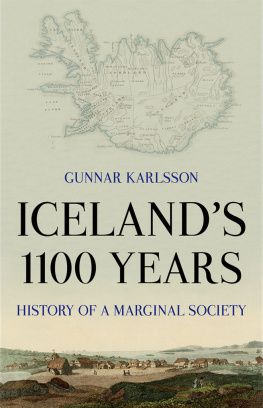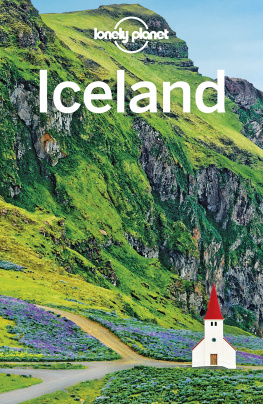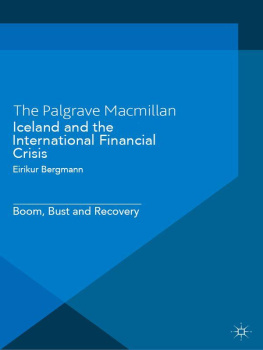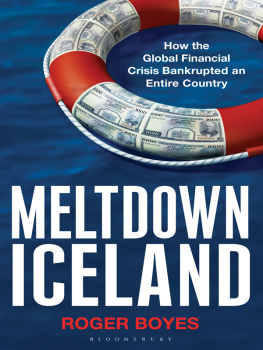WHY ICELAND?
WHY ICELAND?
SGEIR JNSSON
Head of Research and Chief Economist, Kaupthing Bank


Copyright 2009 by The McGraw-Hill Companies, Inc. All rights reserved. Except as permitted under the United States Copyright Act of 1976, no part of this publication may be reproduced or distributed in any form or by any means, or stored in a data base or retrieval system, without the prior written permission of the publisher.
ISBN: 978-0-07-170673-5
MHID: 0-07-170673-9
The material in this eBook also appears in the print version of this title: ISBN: 978-0-07-163284-3, MHID: 0-07-163284-0.
All trademarks are trademarks of their respective owners. Rather than put a trademark symbol after every occurrence of a trademarked name, we use names in an editorial fashion only, and to the benefit of the trademark owner, with no intention of infringement of the trademark. Where such designations appear in this book, they have been printed with initial caps.
McGraw-Hill eBooks are available at special quantity discounts to use as premiums and sales promotions, or for use in corporate training programs. To contact a representative please e-mail us at bulksales@mcgraw-hill.com.
TERMS OF USE
This is a copyrighted work and The McGraw-Hill Companies, Inc. (McGraw-Hill) and its licensors reserve all rights in and to the work. Use of this work is subject to these terms. Except as permitted under the Copyright Act of 1976 and the right to store and retrieve one copy of the work, you may not decompile, disassemble, reverse engineer, reproduce, modify, create derivative works based upon, transmit, distribute, disseminate, sell, publish or sublicense the work or any part of it without McGraw-Hills prior consent. You may use the work for your own noncommercial and personal use; any other use of the work is strictly prohibited. Your right to use the work may be terminated if you fail to comply with these terms.
THE WORK IS PROVIDED AS IS. McGRAW-HILL AND ITS LICENSORS MAKE NO GUARANTEES OR WARRANTIES AS TO THE ACCURACY, ADEQUACY OR COMPLETENESS OF OR RESULTS TO BE OBTAINED FROM USING THE WORK, INCLUDING ANY INFORMATION THAT CAN BE ACCESSED THROUGH THE WORK VIA HYPERLINK OR OTHERWISE, AND EXPRESSLY DISCLAIM ANY WARRANTY, EXPRESS OR IMPLIED, INCLUDING BUT NOT LIMITED TO IMPLIED WARRANTIES OF MERCHANTABILITY OR FITNESS FOR A PARTICULAR PURPOSE. McGraw-Hill and its licensors do not warrant or guarantee that the functions contained in the work will meet your requirements or that its operation will be uninterrupted or error free. Neither McGraw-Hill nor its licensors shall be liable to you or anyone else for any inaccuracy, error or omission, regardless of cause, in the work or for any damages resulting therefrom. McGraw-Hill has no responsibility for the content of any information accessed through the work. Under no circumstances shall McGraw-Hill and/or its licensors be liable for any indirect, incidental, special, punitive, consequential or similar damages that result from the use of or inability to use the work, even if any of them has been advised of the possibility of such damages. This limitation of liability shall apply to any claim or cause whatsoever whether such claim or cause arises in contract, tort or otherwise.
CONTENTS
CHAPTER 1
THE ENIGMA OF ICELAND
AN ULTIMATUM FROM THE KING
In the early morning in the third week of June 1000 AD, the general assembly of the Icelandic parliament, Althing, was called into session. Customarily, the session was held out in the open air, in a natural amphitheater in Thingvellir (Parliamentary fields) in the southwestern part of the country, created by the combination of lava flows and fissure formation in the earth, complete with a speaker podium.
There was great tension in the air as the 39 MPs, known as the Godi, stepped forth and greeted Thorgeir, the law speaker, as he prepared to address the crowd from the podium. The Godi represented free farmers from every corner of the country; indeed, a large part of their constituency stood behind them, fully armed. A small minority of the Godi, accompanying a handful of priests in the full regalia of the Holy Roman Church, occupied a corner of the amphitheater at a distance from the others. Thorgeir had been charged with the task of devising some kind of compromise to solve the worst political crisis the young democracy had encountered since its founding in 930.
lafur Tryggvason, the great warrior king of Norway, had issued an ultimatum to the young state to either convert to Christianity or face his wrath. The Norwegian king was indeed a formidable enemy. He had the largest fleet of long shipswar dragonsin the North Atlantic. The kings standard carrier Worm-the-Long was the largest warship the Viking world had ever known. lafur had used his military might to christen Norway; death and torture awaited those who persisted with their pagan ways. Now, his focus was on Iceland.
The king had sent missionaries to Iceland, German priests accompanied by Icelanders who had served in his army. They had tried peacefully to spread the good word around the country with almost no success. Frustrated, they had resorted to attacking pagan holy sites and temples and killing prominent pagans. The Althing had expelled them from the country and now faced the kings anger.
Obeying this kingsor any kingscommand was not to the liking of the newly established nation. The country had been settled by Norse farmers and chieftains fleeing taxes and tyranny as the first unified Norwegian kingdom had been established around 870900 AD. The Icelanders also knew the king would never risk his precious fleet on the high seas to subdue them. The country was at a safe distance from all Norwegian kings. Nevertheless, King lafur wielded sufficient power to enforce near-total isolation on the country, since most shipping routes to Iceland originated in Norway. Indeed, the king had already given a strong indication that pagans were not welcome in his kingdom by ordering attacks on Icelanders visiting Norway. And to further sharpen the thinking at Althing, the king held five Godis sons as hostages.
To Christianity as such the Icelanders were ambivalent. Quite a lot of the original settlers had lived in the British Isles prior to coming to the country. Some had become Christians in their new country, although their children would revert back to paganism. Others had chosen to worship Christ along with the pagan gods: in peacetime they would pray to Jesus, but when things got tough, Thor was the God to talk to. The majority probably had accepted a rudimentary baptism as a token act to being allowed to be in communion with Christians in the British Isles. Furthermore, a very significant number of the settlers had married local Christian girls. Of the people gathered at Althing in June 1000, practically everyone had Christian grandmothers or at least great grandmothers. There was little religious fervor to the Icelandic paganism, but nevertheless the pagan gods were interwoven into the cultural fabric and identity of the nation. It suffices to mention that the MPs, the Godi, also served as priests or masters of ceremony in pagan festivals. The name God-i is derived from the Germanic word God.
When the commonwealth was founded in 930 it had been proclaimed that Iceland is governed by laws not kings. The new republic prided itself on being able to solve all its affairs through juris prudence and consensus decisions among the Godi. But now the issue of Christianity was threatening to break the commonwealth apart. Iceland might have had a small number of actual Christian converts, but a significant number of people had converted to the idea that Christianity was an absolute necessity to keep the door to the outside world open. Against them stood the conservative diehards that would not abandon the ways of their father and forefathers for White Christ as they would call him. They argued for the self-sufficiency of the nation. These two groups had confronted each other at Althing and each had threatened to secede from the commonwealth and establish a new regime with separate laws. Neither side seemed to be willing to give in. As the Althing convened that fateful day in June 1000, everyone knew that if a political solution was not reached, the arms would talk instead of the Godi.
Next page


